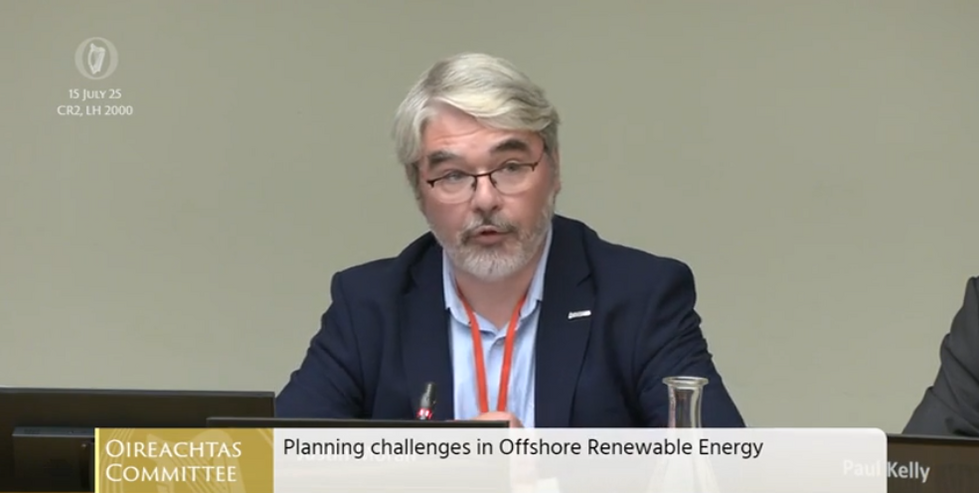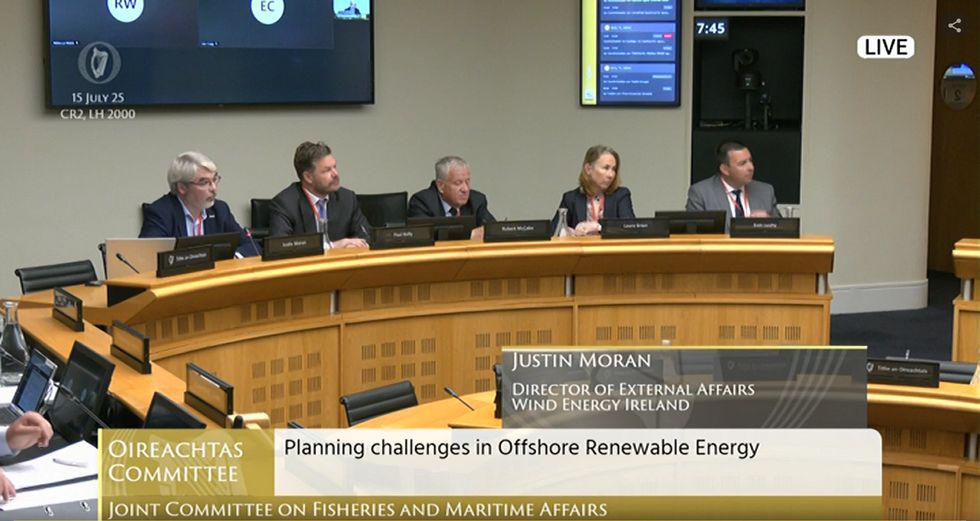Wind Energy Ireland Opening Statement to the Joint Oireachtas Committee on Fisheries and Maritime Affairs
17 Jul 2025
On Tuesday 15 July, a Wind Energy Ireland delegation led by its Director of External Affairs, Justin Moran, and Chair of its Fishing Working Group, Paul Kelly, presented to the Joint Oireachtas Committee on Fisheries and Maritime Affairs on the topic of planning challenges in the offshore wind sector.
A copy of the WEI Opening Statement is below and you can watch the full committee meeting here.

Introduction
Cathaoirleach, members of the Committee, thank you for the opportunity to appear before you today. On behalf of Wind Energy Ireland, and our more than 200 members, I would like to express our appreciation for your engagement with the renewable energy sector.
I am joined today by the chairperson of our Fishing Working Group, Mr Paul Kelly, who is also offshore development manager for RWE Renewables.
Background
It may surprise some to learn that there was a time when Ireland was a global leader in offshore wind energy.
It was 21 years ago last month when our only existing offshore wind farm, Arklow Bank 1, started producing power. Those turbines were, at that time, the most powerful our industry had ever deployed. The lessons learned there were used on countless other projects all over Europe, but not in Ireland.
It is only in recent years that we have started again to look seriously at developing some of the best offshore wind resources in the world, to seize an incredible opportunity to build a resilient economy, and to revitalise coastal communities, with secure, affordable, clean energy.
Progress
There has been significant progress. The first group of offshore wind projects are in the planning system. The second offshore wind auction will take place later this year.
This month marks the second anniversary of the opening of the Maritime Area Regulatory Authority. We commend the work of the team there in building the agency and in developing a strong regulatory framework.
We would like to see more support for MARA to recruit additional staff and to confirm the list of maritime activities which do not require a maritime usage licence, which we believe could reduce workload for the team and speed up timelines.
Another welcome development was the Government’s announcement to develop a national Designated Maritime Area Plan (DMAP). It will identify sites around Ireland that are suitable for fixed and floating offshore wind.
However, it is clear that Ireland will not meet its target to have 5 GW of offshore wind connected to the electricity grid by 2030.
Offshore Wind Action Plan
In May we launched our Offshore Wind Action Plan and we have copies for committee members today.
It sets out critical Government actions required to build a competitive, sustainable and robust offshore wind industry. I would like to highlight two actions I think are important for this committee.
As our April 2023 report showed, it is common across Europe for the State to invest in port infrastructure when there is a clear social and economic case to do so. The Government should update the National Ports Policy to facilitate direct investment in our ports to ensure we maximise the economic benefit to Ireland from the development of offshore wind.
The Government must also ensure the necessary funding is available to deliver the National DMAP by the end of 2027. This will require a strong core staff team as well as resources for technical, environmental and legal expertise.
But it will also require extensive consultation in which coastal communities, and those who depend on the sea, must be given every opportunity to ensure their voices are heard.
It is vital that the resources are put in place to deliver the DMAP on time.
Shared space
In setting out our hopes for our industry we are conscious that we are looking to develop offshore wind energy in a shared space.
We recognise the importance of Ireland’s seafood industry to the country’s economy and food security, as well as its significance to the local economy and culture of our coastal communities.
Over the last three years, representing our industry on the Seafood-ORE Working Group chaired by Captain Robert McCabe, we have heard at firsthand the pressures facing the seafood industry.
We want to ensure that fishermen keep fishing and benefit from the opportunities which the development of offshore wind energy will provide.
We would ask for the committee’s support in three key asks that I believe are shared by our two industries.
First, there should be no effort to ban fishing from operational wind farms. Fishing takes place within the boundaries of wind farms in Britain and there is no reason this cannot happen here. However, fishermen tell us they firmly believe that if wind farms are built the Government or some State agency will prevent fishing. It would be very helpful, and provide reassurance to the seafood industry, if the committee could encourage the Government to give a commitment on this matter.
Second, Irish fishermen should be permitted, where their vessels are suitable, to carry out guard duties on offshore renewable developments and support safety at sea.
Fishermen in Britain and those registered in the north of Ireland can do this and get paid for it. Irish fishermen cannot. This issue is set out in more detail in Use of Fishing Vessels for Commercial Work on ORE Projects - A Guide to Registration, which was produced by the Seafood-ORE Working Group.
Third, we want to work with the seafood industry to put in place a National Framework Agreement for cooperation payments. A fair, transparent and evidence-based system is needed.
To put this in place, and to ensure it operates fairly, it is critical that the Department of Agriculture, Food and the Marine, and its relevant agencies, have the resources they need to work with ourselves and the seafood industry to develop, produce and oversee such an agreement.
Conclusion
I would like to thank the committee for your time and I look forward to seeing the Irish wind energy industry grow into a major source of employment, investment and new opportunities for our coastal communities and for all alongside whom we will work with in our maritime sector.







